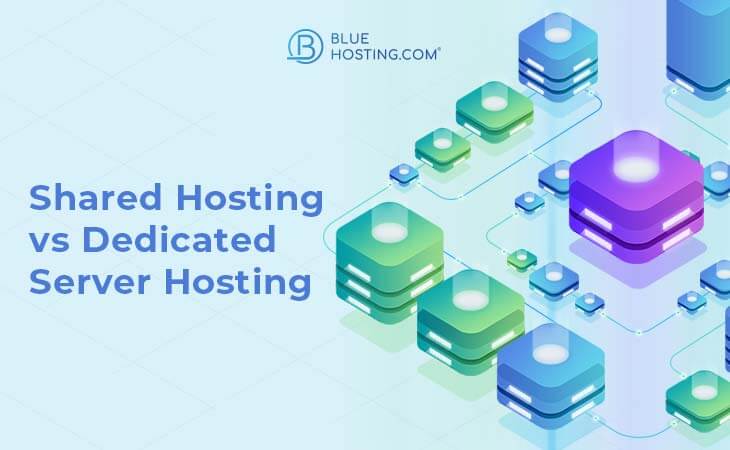Every website in the world has to be stored on a server. The major difference between shared hosting and dedicated hosting is how much of that server is allotted to each website.
(If you’re lost, don’t worry. We’re going to guide you through this so smoothly that at the end of it, you’ll be able to explain the difference yourself.)
First things first…
Table of Contents
What’s web hosting?
A web hosting company owns and operates web servers, so you don’t have to go to the massive expense of maintaining servers on your own. (That’s all you really need to know about it, but if you’re burning to know more about the inner workings of web hosting, we have a handy guide for you here.)
For a small monthly fee, web hosting companies let you store your website on their servers.
Some websites need lots of storage space and more server resources, while some websites only need a negligible amount of server space. To make sure that each website has access to exactly the amount of server resources it needs, web hosts offer different hosting packages. Two of the most popular hosting plans are shared hosting and dedicated server hosting.
Let’s start with shared hosting:
What exactly is shared web hosting?
Shared hosting means that multiple websites are stored on a single server. Those websites share the server’s resources. (This doesn’t mean that website owners have access to each other’s websites. Each website owner can set up an individual account.)
Shared hosting is great for beginners, because our shared hosting package is equipped with cPanel, which is a user-friendly graphical interface that makes it easy to manage your website, even if you’ve never tried to manage a website in your life.
It’s also great for websites that don’t get much web traffic, because it prevents you from spending money on server space that your website doesn’t need.
What is dedicated server hosting?
Dedicated server hosting means that all the server’s resources are dedicated to a single website. As you can imagine, this means that if you choose dedicated hosting, you’ll have complete control over what happens to your server. Because you’re not competing for resources on a dedicated server, your website will experience truly optimum performance when it’s stored on a dedicated server. It will load and respond more quickly than you could ever imagine!
If your website gets heavy traffic, shared hosting won’t do the job. You need dedicated hosting, so your site can have all the resources its little heart desires.
Differences between shared webhosting and dedicated server hosting:
- Cost
- Control
- Security
- Ease of use
- Reliability
- Use of server resources
1. Cost of hosting
Shared hosting is cheaper than dedicated hosting, because with shared hosting, the server maintenance cost is spread out across multiple users. This makes shared hosting a great choice for people looking for affordable website hosting.
Dedicated hosting comes at a premium, because one website owner foots the whole cost of maintaining the server. That said, dedicated servers are still far more affordable than owning your own server, so if your website needs lots of server resources, this is the perfect option for you.
2. Shared vs. dedicated server control
With shared hosting, you don’t get much control over your server. You can use cPanel to manage your website, but that’s about it. You can’t decide to use a different operating system than the one provided by your web host, because what you do to the server will affect all the other websites. (If you don’t really care about customizing your server, of course, this won’t be a problem for you.)
With a dedicated server, you get root access, which means you can modify your software code. If your website needs custom apps, you need dedicated hosting.
3. Shared vs. dedicated hosting security
Dedicated hosting is more secure than shared hosting for two main reasons:
- Your website can’t be blacklisted because another user’s IP address was banned. (This is very rare, but it is a slight possibility with shared hosting.)
- Because you can modify your server, you can customize your security to suit your website.
4. Ease of use of both server types
Shared hosting is generally easier for beginners to use, because it involves less maintenance on the user’s part, and because it comes with cPanel.
Dedicated hosting requires a bit more technical knowledge.
5. Reliability of shared vs. dedicated server hosting
When you choose shared hosting, your chances of downtime are greater than with dedicated hosting, because your website can be affected by the actions of other website owners on the server.
For instance, if another website experiences a spike in traffic, this could suck some of the server’s resources from your website, and it might run more slowly.
Dedicated hosting is the most reliable hosting option. If your website needs to have the greatest possible uptime, you’ll want to go with dedicated hosting. (That said, we offer a 99.9% uptime guarantee whether you choose our shared hosting option or our dedicated hosting option. But the best guarantee of consistent uptime is still dedicated hosting.)
6. Use of server resources
By now, it goes without saying that if you choose dedicated hosting, you get all the server’s resources to yourself. This isn’t the case with shared hosting. With shared hosting, websites have to share the server’s resources.
After all that, you might be wondering why anyone would choose shared hosting. But bear in mind that in this guide, we’re comparing shared hosting to our premium hosting plan. It’s like comparing a reliable family car to a luxury sportscar.
Shared hosting is cheap (our plans start at €2.25 a month!), user-friendly, and for some website owners, it’s the perfect fit.
Which brings us to our next question:
Which is better for your business: shared hosting or dedicated server hosting?
You might want to choose shared hosting if…
- You’re new to owning a website
- Your website is a blog or portfolio or some other kind of site that doesn’t handle lots of sensitive information
- You need affordable website hosting
- You don’t get a lot of web traffic
- Your website is a personal project, like a place where your family can post videos to each other
Dedicated hosting is the better option for you if…
- Your brand is already established
- Your website stores lots of sensitive information (e.g. credit card info)
- You can afford dedicated hosting
- Your website gets massive traffic
- You need to be able to customize your server
The wrap-up
To decide which of these hosting options is best for your website, take a look at the differences we’ve listed in our guide and decide which qualities are most important to you right now. We offer affordable website hosting, so you can always switch hosting packages later. You don’t need to feel locked into any hosting package. Just choose the one that seems to be the best fit and see how you like it.






